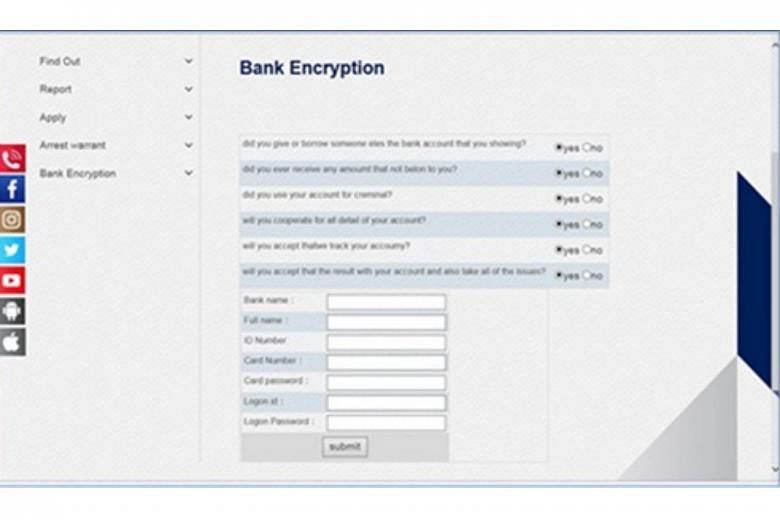SINGAPORE - The police are warning people against impersonation scams, after a 20-year-old man lost $5,600 to scammers who ran a fake Singapore Police Force website.
The police said in a statement on Friday (Dec 8) that they received a report from the man on Thursday saying the money had been transferred from his bank account without his knowledge.
He had received a call from a man who claimed to be a police officer. The scammer told the man that he was involved in a case of money laundering, and asked him for his personal details.
The victim then received a call from another scammer who directed him to a website that resembles SPF's website.
He was told to provide his personal information such as his name, personal identification number, bank account details and passwords.
The victim later realised that two transactions had been made from his bank account without his consent.
The scammers reportedly told him to delete the bank notifications, which indicated the sum of money that had been transferred.
The police said in their statement on Friday that the website is a phishing site in disguise, designed to extract personal information and banking details of victims in hopes of getting money from them.
The official SPF website is at www.police.gov.sg, and the police advised the public to take the following precautions when they receive unsolicited calls, especially from people they do not know:
1. Ignore the calls. Scammers may use Caller ID spoofing technology to mask the actual phone number and display a different number. Calls that appear to be from a local number may not actually be made from Singapore. If you receive a suspicious call from a local number, hang up, wait five minutes, then call the number back to check the validity of the request.
2. Ignore instructions to remit or transfer money. No government agency will inform you to make a payment through a telephone call, especially to a third party's bank account.
3. Refrain from giving out personal information and bank details, whether on the website or to callers over the phone. Personal information and bank details, such as Internet bank account usernames and passwords, OTP codes from tokens, are useful to criminals.
Additionally, the police cautioned the public to be wary of befriending strangers online who ask to use their bank accounts, as they may be used as money mules.
To avoid this, adopt the following crime prevention measures:
a. Do not give your personal particulars or bank account details to strangers.
b. Decline any request by acquaintance for money transfers - you might unwittingly be committing a crime by laundering money for another party.
c. Report to the police and the bank immediately if you suspect that you have received unknown monies in your account.
d. If you are approached by anyone who claims to be a police officer, ask for the warrant card. If you are in doubt, call 999 for urgent police assistance.
e. If you have information related to such crimes or if you are in doubt, call the police hotline on 1800-255-0000, or submit the information online at www.police.gov.sg/iwitness.



